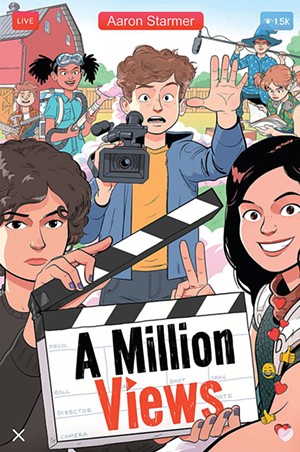
- Courtesy Of Toril Lavender
- Aaron Starmer
Aaron Starmer's new middle-grade novel A Million Views starts with a bottomless pit. Actually, it's a regular hole that 12-year-old Vermonter Brewster Gaines hopes will look like a bottomless pit in a 10-second video.
Making videos is Brewster's raison d'être, and he spends most of his free time plotting them out, filming solo, editing them on his nearly obsolete Mac and uploading his work to YouTube. That and watching his view counts slowly tick upward.
Most of Brewster's videos have petered out in the low hundreds, and he hopes someday he'll make one that garners a million views, a self-imposed benchmark that he believes will validate his craft and existence. A one-man crew, Brewster prides himself on being self-reliant. Or maybe he's just a maladjusted loner who tells himself that.
But Brewster can't realize his latest video concept, "What Do You Do With Friends Who Don't Return Your Messages?" without some help. He enlists new classmate Carly, a skateboarding New Jersey transplant, as his second cast member.
After a day of shooting, word spreads about the project. Carly introduces Brewster to rich girl Rosa, who's willing to bankroll a bigger-budget, expanded version of the clip — to the tune of $5,000. She also wants to be credited as its producer.
Brewster's vision for the video is a one-punch-line, meme-able joke that would have played well on the defunct platform Vine. Rosa and Carly have different ideas. In their hands, the video becomes the trailer for a fantasy film epic in which Carly plummets through a portal into a netherworld full of monsters. The girls figure that if the trailer goes viral, a movie studio will snatch it up and give them a proper budget.
Brewster reluctantly agrees to these changes, tantalized by the semiprofessional gear that Rosa can supply. But as the kids proceed, each problem they face requires a new player. Slowly, a team emerges: ostentatious cosplayer Godfrey, who signs on to play the villain; his quippy little sister, Izzy, who takes on art direction; preternaturally gifted CGI specialist Harriett, who can render complicated 3D effects despite being a year younger than the others; and eager-beaver Liam, an affable if overbearing classmate who happily joins as a production assistant.
As this misfit crew coalesces, it becomes clear that, while Brewster is brimming with vision and heart, he doesn't know much about making movies beyond proper script format. By contrast, Izzy seems to have done her homework: She knows all about automated dialogue replacement, Dutch angles and what to include in a call sheet. Hell, she knows what a call sheet is. Brewster experiences a quiet humbling as he realizes he's out of his depth.
As new challenges emerge in production, the team deftly adapts to the circumstances. Only in the story's third act does a problem present itself that requires a dramatic solution. (No spoilers, but it involves a go-kart.)
Brewster's real evolution in the book is coming to terms with his family situation. His mom and dad seem more like roommates lately, and Brewster's 17-year-old nonbinary sibling, Jade, is in their own little world. We get the impression that everyone has drifted apart.
As Brewster becomes acquainted with the families of some of his crew — particularly Godfrey and Izzy's parents — he takes note of the affection that his own family lacks. While Brewster's parents pick up lackluster takeout for dinner, every night at Godfrey and Izzy's house is a taco party, and the fixings are often strange and creative.

- Courtesy
- A Million Views by Aaron Starmer, Penguin Workshop, 304 pages. $17.99.
What's really missing from Brewster's family is love, and his parents seem oblivious to how they're letting him down. When his dad accidentally sends a suspicious text to Brewster instead of its intended recipient, the boy grasps that his family is falling apart. Instead of confronting his father, he ices him out and throws himself even more into the project.
Brewster's peers have their own problems. Though she doesn't let on, Carly struggles with being a new kid. Wealthy latchkey kid Rosa is cagey about where exactly she got $5,000. And Brewster's neighbor Piper, a late addition to the team, is a shell of her former self, making Brewster wonder what happened to the effervescent girl next door he used to know.
Through crisp prose heavy on action and immediate thoughts and feelings, Waterbury author Starmer magnifies his characters' personalities as they figure out how their skills are complementary — and how they clash. A lot of the book's humor comes from those clashes, as well as from Brewster's inner monologue. Though some of the kids have skills that strain credulity, their excitability and eagerness remind us that they're a bunch of fifth and sixth graders. Take Carly and Rosa's "script" for their film:
There's bunches of color or darkness or maybe some lightning bolts ... It'll feel epic and there will be music that's all violins and booming drums but we can't give away too much of the plot because that's always annoying and we haven't figured it all out anyway.
Ultimately, A Million Views is about chosen family. As Starmer's characters come together, they find the answers to questions they didn't know they were asking. While sifting through the dailies may not always be fun, they relish the time spent goofing on each other and eating snacks around Carly's enormous TV.
Starmer has made a splash with young adult novels such as the internet-savvy thriller Meme (2020) and the darkly absurdist Spontaneous (2016), in which members of a high school class start spontaneously combusting. The latter was adapted into a favorably reviewed 2020 film of the same name. While tamer in content, A Million Views is charming.
The book's flawed characters don't magically fix themselves or each other by the final page. In fact, certain plot points feel realistically unresolved, including some of Brewster's parents' drama. Starmer doesn't try to convince his malleable young readers that life always ties itself up in a neat package. Though the characters never say it out loud, they do eventually realize that using arbitrary metrics such as view counts to measure their self-worth isn't worth the stress.
A Million Views also offers a workable blueprint to young digital natives who might want to try their hand at semipro filmmaking, including examples of how to format a script and call sheet, clues about setting up a shot to get the best lighting, and cautionary examples of how mounting costs can gobble up a budget.
Most importantly, Starmer lets readers know that it's OK to reach out for help — and that life is more fulfilling when you're part of a team.
From A Million Views
Carly had agreed to play the role of the friend. She was a skateboarder and accustomed to falling. In fact, she was quite good at it.
"What time do you want to start?" she asked.
"As soon as school is over," he said. "Maybe sooner. Would you be willing to skip?"
"Would you be willing to dress up as me and take my detention?"
"I would," Brewster replied.
This wasn't a lie. Brewster had proven he was willing to suffer for his art. He'd broken bones — two fingers during GoPro recording of a go-kart stunt at a local carnival. He'd contracted a stomach virus — after which he decided that working with toddlers, even well-behaved ones, might not be worth it. He'd been kicked out of Target more than once — store managers aren't always appreciative of stop-motion video productions being filmed in the produce section with borrowed toys. So yes, he was always ready to make some sacrifices to ensure top-notch productions.









Comments
Comments are closed.
From 2014-2020, Seven Days allowed readers to comment on all stories posted on our website. While we've appreciated the suggestions and insights, right now Seven Days is prioritizing our core mission — producing high-quality, responsible local journalism — over moderating online debates between readers.
To criticize, correct or praise our reporting, please send us a letter to the editor or send us a tip. We’ll check it out and report the results.
Online comments may return when we have better tech tools for managing them. Thanks for reading.